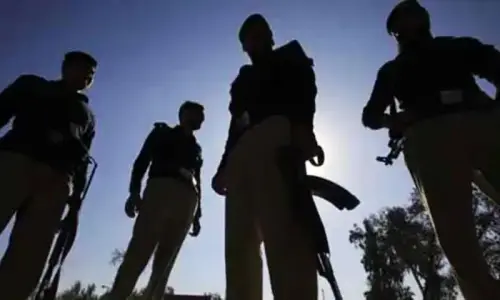BORN and raised in a privileged class, away from her homeland, Pakistan, Humaira Shahid enjoyed a happy and liberal childhood. She came to Pakistan as a teenager and later could have easily opted to pursue her (once) chosen career — teaching literature and gender studies — and lead a sheltered life of luxury and peace, oblivious to the miseries that the general population of her homeland finds itself trapped in.
But her calling lay elsewhere. Shahid describes the journey of her life in her memoirs titled Devotion and Defiance: My Journey in Love, Faith and Politics.
Having been encouraged by her parents to think for herself rather than take the subservient role imposed on many Pakistani women and at the same time harbouring notions of defying conventions, she shrugs off the pressure for an arranged marriage. At the university where she was teaching, she meets the scion of a newspaper owner, falls in love and marries him. Shahid initially remains indecisive about joining the family newspaper, Khabrain, as a journalist, in spite of frequent suggestion from her in-laws. But when her husband asks her “where [her writing] can have the greater impact,” she realises that that’s what she wants to do. Taking charge of the newspaper’s section geared towards female readers, Shahid revamps it. What was once meant to cover lifestyle, fashion and gossip starts to feature stories about the plight of women. And from here, Shahid’s journey begins.
At the newspaper, Shahid is exposed to the harsh realities of life women in our society face day in and day out. Early on in her career, she visits a village where the jirga had ordered that a girl be married to the man who raped her. Shahid feels helpless as she leaves the victim sobbing hopelessly in the dark hut while the girl’s father accepts the decision, saying he has no choice. Shahid is told by the village elder that she wouldn’t understand as she is from a city and these are their customs.
While working for the ‘helpline’ the newspaper established to help people voice their grievances, she meets many women who were victims of traditions such as vani, of acid attacks, of jealous husbands, shunned suitors or cruel in-laws. Aggravating their sufferings was the indifferent authority figures or institutions of law when approached in quest of justice. Stories upon stories evidence that women in Pakistan are victims of institutions and traditions that are deeply lodged in our culture and politics.
In 2002, while Shahid is crusading on their behalf, she is chosen for a reserved seat in the Punjab provincial assembly. With her selection as member of parliament, Shahid sees an opportunity to address some of the many ills in the society, such as child marriages and customs like vani. But she is taken by surprise not only at the disinterest and inaction of most of the reserved seat members but also at how female colleagues are treated by the male members of their own party, especially the few women who try to make their presence felt. Undeterred, Shahid continues to take her job seriously, preparing earnest memos and well-researched proposals to make some headway in legislation to ban private money lending and criminalise crimes against women. She receives another surprise when even her own party members create hurdles and treat her with disdain.
In her fascinating memoir, Shahid shares heartbreaking and enraging stories of people she tried to help. She recounts her fight for the rights of women and the poor and the hindrances that were put in her way, like lack of quorum in committee meetings or a committee chairman who kept silencing her by calling for tea breaks rather than making any attempt to work on her bill. As her crusade gains media attention, Shahid receives anonymous phone / email warnings to resign or face grave consequences. Yet she remains persistent, wins some allies and after years of struggle, succeeds in getting some work done.
In a way, Shahid’s book is an account of her struggle to stir Pakistan’s male-dominated political establishment. It offers a glimpse inside Pakistan’s weak and corrupt democratic system and shows how those in a position to often choose not to act, sidestepping truth no matter how horrific, to safeguard their or their underlings’ vested interests.
Interwoven with her narration of the fight for justice for women is the story of Shahid’s marriage and family life. This at some places may feel like a distraction from the main story but provides a personal touch to the book, which otherwise may have become a monotonous narrative of the abuse of women and a woman’s struggle to seek justice for them.
The reviewer is a Dawn staffer
Devotion and Defiance: My Journey in Love, Faith and Politics
(MEMOIRS)
By Humaira Awais Shahid with Kelly Horan
W.W. Norton and Company, New York
ISBN 978-0-393-08148-0
294pp.

































